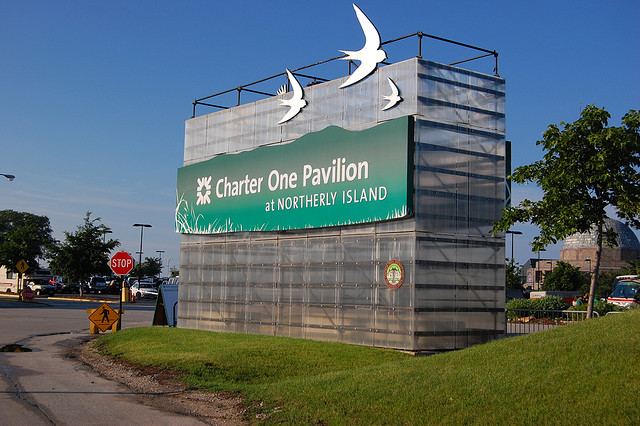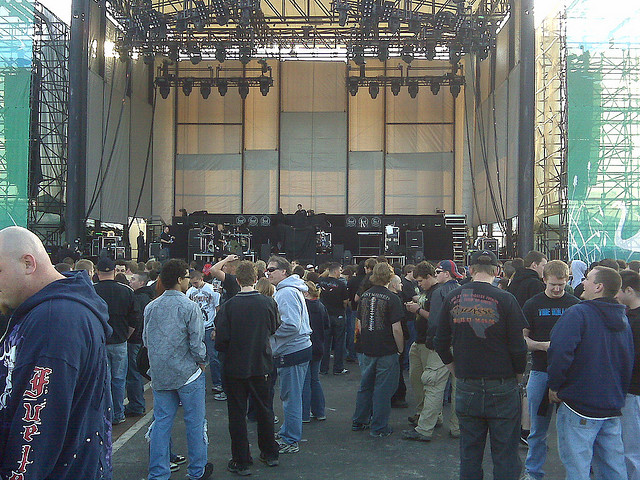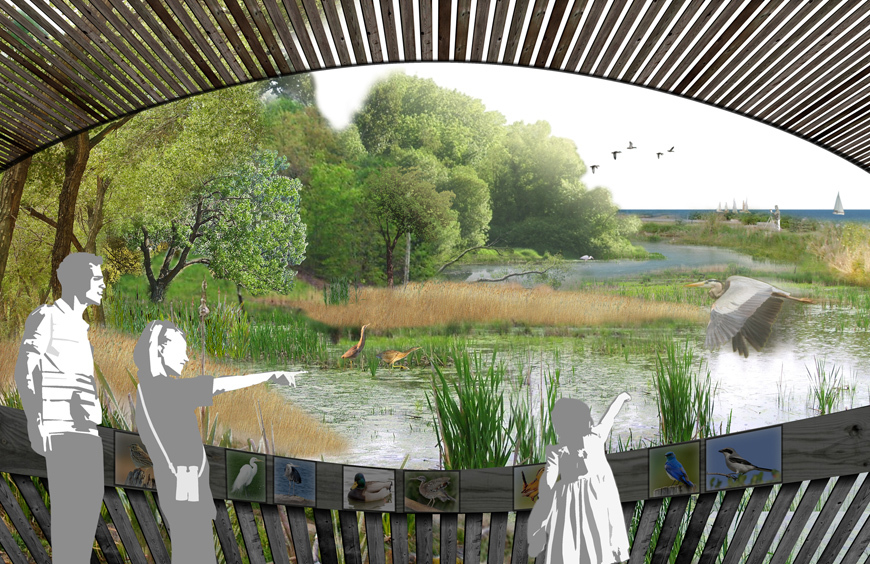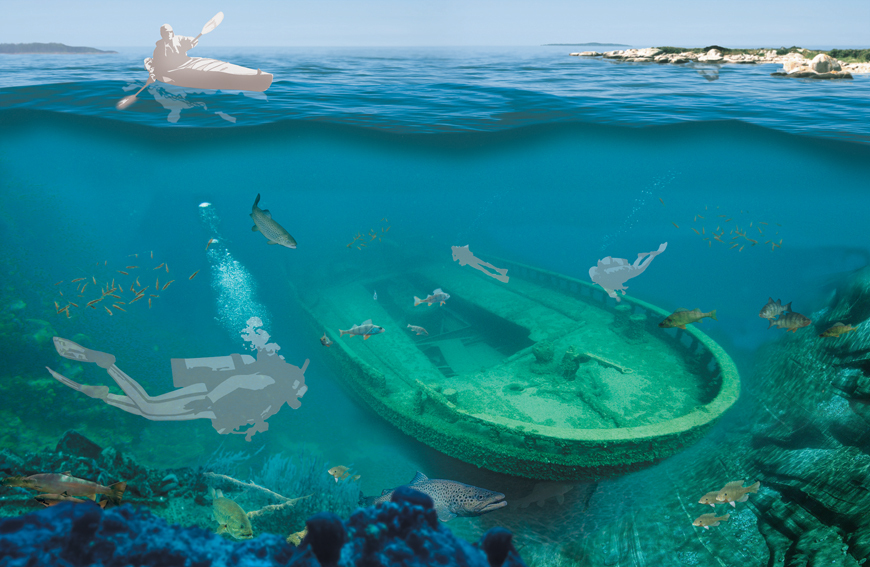Did the Chicago Park District sidestep competitive bidding for the Northerly Island concert venue?
By Jim DeRogatis

Did the Chicago Park District sidestep competitive bidding for the Northerly Island concert venue?
By Jim DeRogatis
When the Chicago Park District decided to allow giant national concert promoter Live Nation to expand its Northerly Island music venue from 8,000 to nearly 30,000 seats, it never considered any other bidders for the project, and it ignored specs for the venue issued in its last request for proposals in late 2011.
The City Plan Commission unanimously approved the expansion in March, almost quadrupling the size of the lakefront concert arena. With it will allegedly come $2 million in increased annual revenues for the city—as well of course as larger profits for Live Nation.
Live Nation is the only company that has operated the venue since it opened in 2005, and it was the only company that responded to the request for proposals in 2011. But other promoters say they did not think they could compete with the concert giant and profit at a venue holding 8,000 concertgoers.
Indeed, Live Nation for the last eight years has primarily presented state fair-level acts on Northerly Island—among them bands such as the Doobie Brothers, REO Speedwagon, Pat Benatar, and the Goo Goo Dolls—often falling short of the goal of selling out 8,000 seats.
A 30,000-seat venue is a different story, however: It puts Northerly Island on the same scale as Live Nation’s other big outdoor amphitheater in Illinois, the First Midwest Bank Amphitheatre in Tinley Park, but at a much better location. As such, it becomes one of the country’s biggest and most attractive “sheds,” as these outdoor amphitheaters are called in the concert industry.
While Live Nation only will stage four concerts at the 30,000-capacity venue this summer—Jimmy Buffett on June 29 and Phish from July 19 to 21—executives say they hope to offer six to eight of that size in seasons to come, along with a full slate of two dozen or more smaller-capacity bookings.
Competing concert promoters declined to comment on the record, fearing reprisals from the Park District in other business dealings. But they say they never were given a chance to bid on the larger, more profitable venue, or to show whether they could have earned even more for the city.
The city’s treatment of Live Nation on Northerly Island is not unlike someone who signs a lease for a studio apartment and winds up living in a mansion.

This is not the first time Live Nation has received favorable treatment from the city on Northerly Island. Here is the back story:
In early 2005, two years after Mayor Richard M. Daley tore up the runways at Meigs Field in the middle of the night, the Park District awarded a contract for “an open-air boutique amphitheater” on Northerly Island to Clear Channel Entertainment, now renamed Live Nation and merged with Ticketmaster.
This was a considerable affront to the other leading bidder in the proposal process, local concert promoters Jam Productions, which had initially conceived the plan and pitched it to the city. Jam lost out when the Park District put the proposal out to bid and awarded a three-year contract with the option for two one-year extensions to Jam’s arch rival Live Nation.
Because the city’s long-term plans for Northerly Island had not yet taken shape, much of the concert venue was erected each spring and torn down again each fall, resulting in an even less comfortable and more shoddy facility than the widely disliked First Midwest Bank Amphitheatre.
Of course, Live Nation also promptly sold the naming rights to the new Northerly Island venue, hence its current name: the Charter One Pavilion.
As noted earlier, the contract was for three years with two one-year extensions, which meant it expired at the end of the 2009 concert season. How did Live Nation get seven years on a maximum five-year deal?
In 2010, the city apparently was too distracted to issue a new request for proposals and bother with that whole required-by-law competitive bidding process. “It would not have been useful for the Chicago Park District to issue the request for proposals with the future of the Olympics being uncertain,” Park District spokeswoman Jessica Maxey-Faulkner said at the time.
In 2011, the Park District didn’t even offer an excuse—it just gave Live Nation another extra year because… well, why not?
That December, the city introduced its long-term plans for Northerly Island with a burst of media hype, as evidenced by the relatively breathless prose in the Tribune (“New Northerly Island Park plan promises an oasis of ecology—and Daley’s last hurrah”) and the Sun-Times (“Big Dreams for Northerly Island”).
The grand plan called for what Trib architecture critic Blair Kamin called “a new concert pavilion that resembles a giant land mound, serene wetlands for migrating birds and bird-watchers, and a picturesque chain of reefs that would protect a deep-water lagoon where people could swim, canoe and kayak.” Oh, and “at the lagoon’s bottom would be a sunken ship that divers could explore.”



Shortly after the plan was announced, the Park District issued a request for qualified bidders, the first step before a request for proposals. Four entities responded: AECOM Services of Illinois with Tishman Construction Corporation of Illinois and SMG; Ardmore Associates, LLC with Magellan Project Services, LLC; Live Nation Chicago, Inc., and US Equities Realty with Jam Productions, Ltd.
Since then, however, Daley’s chair has been occupied by a new mayor. The Park District has not yet awarded the contract for the full, three-phase redevelopment plan. But, as announced at a press event by Mayor Rahm Emanuel, it did break ground earlier this year on phase one—an urban campground—with funding from a federal grant and revenues from previous seasons’ concerts.
No timetable has been set for that permanent “land mound” concert venue. But, perhaps realizing that giving Live Nation an eighth year on a three-year contract for the temporary venue really would be pushing things, the Park District issued a new request for proposals for the temporary venue in November 2011.
This request for proposals specified that the venue “sits on an eight-acre footprint at the north end of Northerly Island” and that “its current capacity holds approximately 8,000 people.” No mention was made in the 100-page document of expanding that capacity.
Three companies picked up that request for proposals: Live Nation, Jam Productions, and SMG, the Pennsylvania-based arena management company that operates Soldier Field. Only Live Nation responded with a proposal, and it won the contract—two years this time, with the possibility of three one-year extensions—to continue operating an 8,000-seat venue.
So when did 8,000 become 30,000, making Northerly Island one of the biggest outdoor amphitheaters in the country?
That’s a good question, and I first posed it to the Park District’s spokeswoman and requested interviews with officials there on April 9. For the next seven weeks, over the course of 10 emails and three phone calls, Maxey-Faulkner said she was working to get some answers, but it was difficult to schedule time with the ever-busy Park District chiefs.
On May 1, the spokeswoman asked for my questions in writing, and I reluctantly sent them along, objecting that email interviews are inferior to in-person or phone interviews.
1. I’d like a timeline from the point when the Chicago Park District issued its request for proposals for an 8,000-seat venue on Northerly Island in late 2011 to the point of the Board approving a 30,000-seat venue for Live Nation a few weeks ago. I want to know the process behind this decision, step by step.
2. I’d like comment on why a second request for proposals was not issued for this substantially larger venue; it seems as if only one bidder (Live Nation) was considered, and that no other company had a chance to bid on it (that is, the 30,000-seat venue as opposed to the 8,000-seat venue).
3. Several of Live Nation’s competitors checked out that 8,000-seat request for proposals in 2011. I know only Live Nation responded with a proposal. But why did the Park District think those other entities not interested in the Northerly Island concert venue at 8,000 capacity automatically would not be interested at 30,000 capacity? They are very different business propositions in the concert industry, and a request for proposals for a venue of that size almost certainly would have attracted more responses, according to my sources in the concert industry.
4. Why was there no environmental impact study of 30,000 people traipsing over a site that is in part earmarked for a nature preserve? The impact of 30,000 concertgoers on Northerly Island will be significantly more than 8,000 people, especially given the kind of shows now being booked.
As of Wednesday evening, Maxey-Faulkner still could not say when she would provide answers to these questions, much less schedule interviews with Chicago Park District Superintendent Michael P. Kelly or Park District legal chief Timothy King.
Mark Campana, co-president of North American concerts for Live Nation, told the Tribune in March that the Park District began exploring ideas to increase revenue at the concert facility two years ago—or about the time of the second request for proposals. As noted, however, no mention of expanded capacity was made in that document.
“Live Nation, which had been booking the facility, proposed reconfiguring the current stage to accommodate more fans,” Greg Kot wrote in the Tribune. “For the bigger shows, the temporary, movable stage will now face south instead of east. About 22,000 fans will be accommodated on a lawn behind the grandstand seats; fans will be able to see the stage from the lawn, but there will also be two large LED video screens and a new sound system installed.”
No additional parking will be provided for the larger venue. Instead, the Park District is encouraging concertgoers to bike, take public transit, or park at Soldier Field and walk or take a shuttle bus to the concert site.

The problem with the latter option: A significant proportion of the crowd of 30,000 will be traipsing through the southern end of the island earmarked for the nature preserve in order to get to the music venue at the north. Tens of thousands of people can disrupt a lot of nature on their way to party down with Buffett or Phish, yet neither the city nor Live Nation has done an environmental impact study.
Eager for the increased revenues, the city’s relatively toothless environmental watchdog groups—several of which declined to comment for this report—once again rolled over on the Northerly Island concert expansion, just as they did for expanding Lollapalooza in Grant Park.
“There are six different ecosystems on Northerly Island; the only way we can fund all of that is with more private money,” Bob O’Neill, told the Tribune in another article in March.
Needless to say, Chicago being Chicago, politics also are a consideration. And here it is worth noting that Hollywood super-agent and mayoral brother Ari Emanuel sits on Live Nation’s board of directors.
Live Nation executives as well as Ari and associates at William Morris Endeavor were major donors to the first Emanuel mayor campaign. According to the Sun-Times, the same sources are contributing to the next Emanuel campaign.
When Ari’s brother Rahm was running for mayor of Chicago, the politician pledged to appoint an independent negotiator to handle all dealings with Live Nation, as well as with Lollapalooza. (Ari’s agency owns 50 percent of that giant concert, which has an unending deal with the Park District for Grant Park.)
The mayor broke his promise for an independent negotiator when the Park District renegotiated its deal with Lollapalooza, and he has done the same with Live Nation on Northerly Island.
Emanuel could claim that the Park District is an independent agency that does not take direction from the mayor’s office. But even setting aside justified skepticism about that defense—he certainly takes credit for all of the Park District’s accomplishments—the goal of a pledge like the one the mayor made during the campaign is to avoid even the appearance of a conflict of interest.
The bottom line is that it’s hard to look at the Park District’s dealings with Live Nation without seeing favoritism. Nevertheless, the company will occupy Northerly Island through at least 2016, and likely far beyond.
2011 Northerly Island RFP by Chicago Public Media
Some earlier reports in this blog about Ticketmaster/Live Nation:
Mar. 21, 2013: City OKs expansion of Ticketmaster/Live Nation on Northerly Island
Feb. 7, 2011: Rahm Emanuel: Pal$ with thuggish concert giants Ticketmaster/Live Nation and Lollapalooza
Feb. 4, 2011: Will there be concerts on Northerly Island this summer?
Nov. 2, 2010: Jam to Ticketmaster/Live Nation: Drop dead!
June 21, 2010: It’s official: Ticketmaster/Live Nation free to devour the concert business





